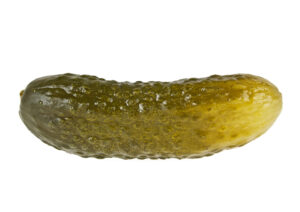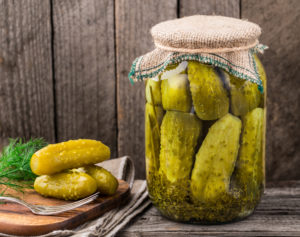Lately, I’ve been working on my herbal garden and just planted some rosemary and lavender. I saw dill plants available for purchase, but those won’t grow as a perennial in my Colorado area because the herb won’t survive temperatures below 25 degrees. Our winters always include temperatures in single digits, or below! So a dill plant is not an option in my herb garden, however, it might be for you. Today’s article is to tell you why a dill pickle is good for you! I’m going to share the medicinal benefits of this delicious and ancient weed!
 The dill plant is related to the “carrot” family of plants which sounds bizarre. Dill is an “umbellifer” which means it is related to asafoetida, caraway seeds, celery powder, parsley, coriander seeds, and fennel. An allergy to one of the spices may mean you have a cross-sensitivity to the others listed here.
The dill plant is related to the “carrot” family of plants which sounds bizarre. Dill is an “umbellifer” which means it is related to asafoetida, caraway seeds, celery powder, parsley, coriander seeds, and fennel. An allergy to one of the spices may mean you have a cross-sensitivity to the others listed here.
Anethum graveolens, commonly called dill or dill weed, has been used for eons because it has incredible health benefits for your intestinal tract. It can help with diarrhea, flatulence, indigestion, and stomach pain. It stimulates appetite too. Active constituents in dill stimulate and activate digestive juices and bile so it aids digestion.
Dill has a lot of iron, magnesium, and vitamin B6. Since it contains many antioxidants like vitamin C and natural beta carotene, it reduces damage from free radicals. It’s great for kidney and urinary tract health, as well as the brain, heart, and eye tissue. As an added perk, dill may help to lower LDL cholesterol very slightly. Dandelions can help with a lot of these areas as well. You can learn more from this article I wrote called “8 Surprising Benefits of Dandelion Weeds.”
Just a note of caution, dill supplements have mild diuretic properties so if you take a supplement, that might mean you lose water more rapidly. This is helpful for people with hypertension, however, it could be a problem for some people who take lithium for example. Talk to your doctor about using a dill supplement that is concentrated. This warning does not apply if you are sprinkling a dash of dried dill spice, or adding a sprig of fresh dill to your meal.
Here are 8 ways you can incorporate fresh dill into your day:
1. Put on top of vegetables during the last two minutes of roasting
2. Add it to potato salad
3. Use it in soup
4. Make a tzatziki sauce and add dill
5. Make dill pickles!
6. Put it on top of fish before you cook
7. Make a “tea” by steeping sprigs of dill for 5 minutes in water, add honey/lemon
8. Scissor a small sprig of dill into your garden salad
 Some people wonder if drying dill is better than freezing it. I recommend freezing it and it’s very easy. Rinse fresh dill of impurities in water and shake off the excess, then pat the sprigs dry. Lay them out on a cookie sheet and put in the freezer to flash freeze them. Later on, you can transfer the frozen dill sprigs to a storage bag and keep them in the freezer for up to 6 months. If you are supplementing with dill tablets, please make sure you ask your doctor if it’s right for you, especially if you already take blood pressure pills or diuretics.
Some people wonder if drying dill is better than freezing it. I recommend freezing it and it’s very easy. Rinse fresh dill of impurities in water and shake off the excess, then pat the sprigs dry. Lay them out on a cookie sheet and put in the freezer to flash freeze them. Later on, you can transfer the frozen dill sprigs to a storage bag and keep them in the freezer for up to 6 months. If you are supplementing with dill tablets, please make sure you ask your doctor if it’s right for you, especially if you already take blood pressure pills or diuretics.
CLICK HERE to read my blog 3 Surprising Ways Pickle Juice Solves Health Problems

Suzy Cohen, has been a licensed pharmacist for over 30 years and believes the best approach to chronic illness is a combination of natural medicine and conventional. She founded her own dietary supplement company specializing in custom-formulas, some of which have patents. With a special focus on functional medicine, thyroid health and drug nutrient depletion, Suzy is the author of several related books including Thyroid Healthy, Drug Muggers, Diabetes Without Drugs, and a nationally syndicated column.
